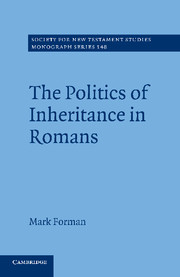Book contents
- Frontmatter
- Contents
- Preface
- List of abbreviations
- 1 Introduction: the politics of inheritance?
- 2 Some features of Greco-Roman society in the symbols, ritual and literature of Paul's time
- 3 Promising the world: inheritance in Romans 4:13–25
- 4 Suffering “conquerors”: inheritance in Romans 8:17–39
- 5 “Riches for the world”: inheritance in Romans 11:1
- 6 “Lords” over all the world: the language of inheritance in Galatians
- 7 Inheritance in 1 Corinthians and Colossians
- 8 Conclusions
- Bibliography
- Index
6 - “Lords” over all the world: the language of inheritance in Galatians
Published online by Cambridge University Press: 03 May 2011
- Frontmatter
- Contents
- Preface
- List of abbreviations
- 1 Introduction: the politics of inheritance?
- 2 Some features of Greco-Roman society in the symbols, ritual and literature of Paul's time
- 3 Promising the world: inheritance in Romans 4:13–25
- 4 Suffering “conquerors”: inheritance in Romans 8:17–39
- 5 “Riches for the world”: inheritance in Romans 11:1
- 6 “Lords” over all the world: the language of inheritance in Galatians
- 7 Inheritance in 1 Corinthians and Colossians
- 8 Conclusions
- Bibliography
- Index
Summary
Inheritance, Romans and Galatians
The discussion of inheritance in Romans found that for Paul the concept refers to a geographical reality which includes the renewal of creation and that it also expresses the universal sovereignty which will be given to those who are “heirs” of the promise. It is apparent from the discussion of these texts that inheritance should not be understood in spiritualized and individualized terms but is best read as one way in which Paul refers to the future transformation of the earth and God's people. But what of Galatians? To what extent is there such a this-worldly emphasis when Paul uses the word “inheritance” in this letter?
There are certainly some parallels between one of the passages considered above (Rom. 4:13–18) and one of the texts in Galatians (3:15–29) which explicitly uses the language of inheritance. There are, for example, striking similarities between Gal. 3:16, 19, 21, 26–29 and Rom. 4:13 and there is also conceptual affinity between Rom. 4:14 and Gal. 3:18 and Rom. 4:16 and Gal. 3:15–18. In both contexts Paul draws on Genesis 15, 17 and 18 in order to argue that a worldwide family was always envisaged. Paul also suggests in both Romans 4 and Galatians 3 that this family would be characterized by faith, not by the law or circumcision. Common to both texts is also the conviction that this family is marked out by those who believe in Jesus Christ.
- Type
- Chapter
- Information
- The Politics of Inheritance in Romans , pp. 172 - 206Publisher: Cambridge University PressPrint publication year: 2011

